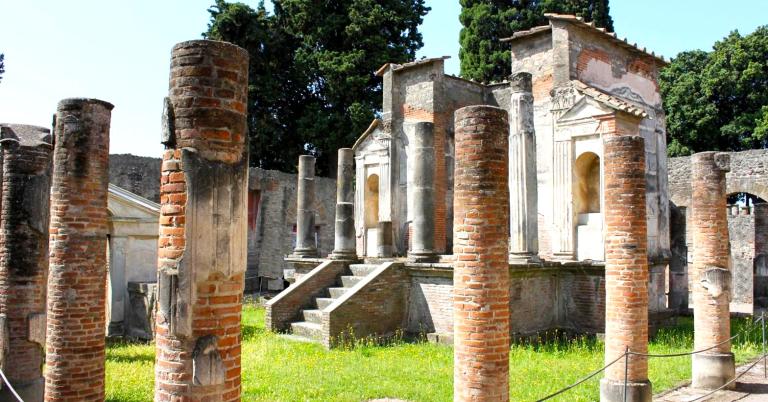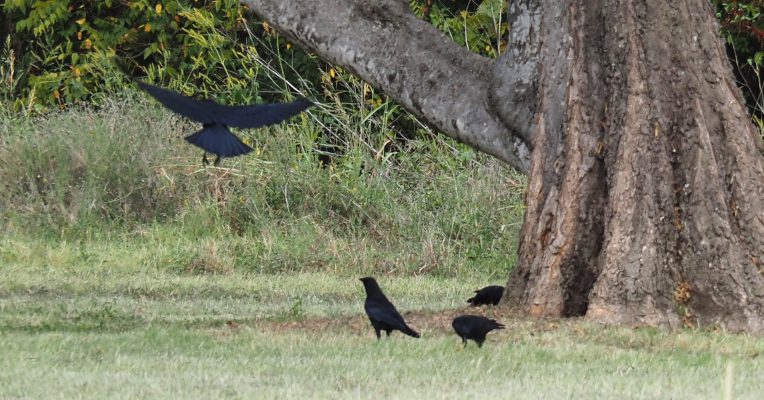We all know that Christianity is declining in the United States. The trend that began around 1960 has been consistent over the years – now the decline is steepening. Christianity is still the dominant religion by far, but the percentage of Americans who call themselves Christians is down to 64%.
For the most part, the people who are leaving Christianity aren’t becoming atheists, or Pagans, or Muslims, or anything else. They’re becoming religiously unaffiliated, often called “Nones” – for “none of the above.”
The Pew Research Center has a new report titled Modeling the Future of Religion in America. It looks at four different scenarios. In all of them Christianity continues to decline over the next 50 years. In all but one Christianity drops below 50%.
Most of Christianity’s loss will be the Nones’ gain. They’re expect to rise from 30% today to as much as 52% by 2070. Other religions will grow, from 6% to around 12%. But “other religions” includes Jews, Muslims, Buddhists, Hindus, and atheists. Pagans are projected to remain a tiny minority.
What does all this mean for us as Pagans?
The future is unaffiliated
The thing about keeping a blog for 14 years is that you’ve got a lot of opportunities to be wrong. In the early 2010s I thought we were at the beginning of a Pagan restoration. I knew Paganism (in all its many variations) would remain a small religion in my lifetime, but I genuinely thought it was well-suited for the world ahead and that many of those leaving Christianity would find their way into our circles.
They aren’t, and this study says they won’t.
I’m OK with that. Paganism isn’t a proselytizing religion. The success of our religion(s) isn’t determined by the number of people who follow it. It’s determined by how well it helps those of us who do follow it to live good and virtuous lives, to live in harmony with the Earth and with all those who share it with us, and to deal with the Big Questions of Life – especially the mystery of death and what comes after death. As we know from the mainstream culture, just because something is popular doesn’t mean it’s good.
I’m sure many Pagans will say “this doesn’t mean anything – I’m going to keep doing what I’ve been doing.” That’s not a bad response. Running your religion by market research is how you end up with bad worship bands and churches that look like big box stores. We need to be faithful to our Gods, our traditions, and each other.
At the same time, we have a sacred obligation to perpetuate our traditions. We need to make sure what we have today is available for those who want and need it in the future. And we need to make sure we don’t waste our very limited resources (of time, energy, and money) on things that aren’t going to be helpful to ourselves or to others.
The need for religion remains
The religiously unaffiliated aren’t becoming atheists (for the most part, anyway). As the report says “Many religious Nones partake in traditional religious practices despite their lack of religious identity, including a solid majority who believe in some kind of higher power or spiritual force.”
As I wrote in 2014, “some religion is organic. It flows naturally from human experiences that are universal or very nearly so.” If people abandon established religions, they don’t stop having the kinds of human experiences that give rise to religions. They still need beliefs to help them understand their experiences, and practices to facilitate future experiences and to incorporate them into their lives.
Formal religion or not, people still have to deal with the Big Questions of Life. They still wonder where we came from, why we’re here, and what happens after we die. They still have to deal with hurricanes, tornadoes, and pandemics. A few people are satisfied with purely naturalistic, purely rational approaches to these questions and difficulties. Most of us aren’t. It isn’t that we need to believe in something – it’s that we need to be a part of something greater than ourselves.
The Nones who abandon Christianity still acknowledge a higher power(s), still celebrate religious holidays (usually those of their childhood), and still participate in rituals that provide meaning and context.
And so freed from the requirement to adhere to orthodox Christianity, they find that meaning and context where ever they can.
Let’s make sure they can find it in Paganism.
Build to serve the Gods
“If you build it they will come” is the tag line from a very good movie, but it’s a lousy strategy for religions. “Storefront church planting” worked for Evangelicals for a while, but it’s not working for them anymore. It never worked for Pagans, at least not for more than a couple years.
Here’s a Wild Hunt story about a new temple to Apollo in Italy, built by the Pietas organization. The thing that stands out is the size – it’s small. Which is fine. It’s meant to be a shrine for Apollo, not a meeting place for the followers of Religio Romana. And it’s historically accurate – it’s not much smaller than the Temple of Isis at Pompei. Pietas has plans for a larger temple that will be a community gathering place, but they’re building it as they need it and as they have funds.

Too much of our time – even just our wishful thinking – has been centered on having what the Catholics and the Baptists and the Muslims have. We do better when we build to serve the Gods and to serve the communities we have and not for the needs of Pagans far in the future.
Do what we do best: support solitary practitioners
This particular Pew study doesn’t get into the reasons why so many people are becoming religiously unaffiliated, although other studies have. Weak worship and the hijacking of Christianity by rightwing nationalists have a lot to do with it, but so does that fact that religious communities are messy, even in the best of times. People decide they’re better off without the bother.
We have plenty of experience with this in our own movement. Paganism in general and Wicca in particular have had a strong presence of solitary practitioners since Raymond Buckland published Saxon Witchcraft in 1973.
Can I say that this bothers me? Religion is best done in community, in a group of people who support each other as they move in (roughly) the same direction. I never would have gotten to the point I am now without others to help me along the way.
But if people only want religion on their own terms, then that’s the only way they’re going to do it.
So let’s do what we can to support solitary practitioners. Some of that means doing things online instead of in-person (or online in addition to in-person). But more is simply developing and refining the kind of practices that can be done by one person working alone. We’re already doing a lot of that – we’re going to need to do a lot more.
Present Pagan concepts and values
We don’t have to make a big splashy appearance for the eight high days on the Wheel of the Year – though it’s getting to be the time of year when the mainstream media remembers that Pagans and witches exist. We just have to be visible.
Given the impact of climate change – something that’s only going to get worse in the coming years – it’s helpful to remind people that Nature is sacred, the Earth is our Mother, and we’ve only got one planet, no matter what Elon Musk is planning. The entertainment world does a good job of reminding people of the power of witchcraft – we just have to show them the reality behind the fiction. The stories of our Gods never really went away – we need to keep telling the old ones, and remembering that we can tell our own stories as well.
Continue building Paganism
Modern Paganism is a new religion. And as a new religion, we still have a lot of work to do.
We need to develop a robust metaphysics, built on a foundation of animism. We need to develop Pagan philosophy for our times. Plato et al. are wonderful and I’m so thankful some of their work survived to the modern era. They’re a great place to start, but we need to continue this work.
Ancient Pagans were the first theologians – we need our own thinking about the Gods. I try to do some of that here, as do others. We need more.
And most of all, we need a broad arrangement of spiritual practices: the things we do on a daily, weekly, monthly, and seasonal basis that keep us connected to our Gods, ancestors, and other spiritual allies.
We have some of this. We need more.
Facilitate greater spiritual depth
This is my religion – I’m quite religious about it. And while it annoys me (at times, anyway) when people don’t show much interest in religious matters, I know I’m the minority here, not them. There’s a reason why there are so many Paganism 101 books and so few advanced books.
The Path of Paganism (which I consider a 200 level book) outsells Paganism in Depth (a 300 level book) 4 to 1.
Still, as we welcome and support those who just want the basics, we also need to support those who want to take their Paganism to new depths.
The good news is that this sort of work has always been done by individuals, occasionally working together but more often working alone and then sharing their experiences.
This is the most urgent matter in my own practice at the moment. Where do I need to go, what do I need to do, and what are things going to look like when I get there?
I’m not sure. But I’m sure of this much: my public facing work needs to be geared toward presenting Pagan beliefs and practices to the unaffiliated, not toward building for a Pagan restoration that isn’t going to happen.
This is reality – accept it and move forward
It’s interesting watching the Christian reaction to this news. Most denominations are doubling down on what they’ve been doing. Einstein didn’t say it, but the definition of insanity really is doing the same things and expecting different results.
I’m disappointed – but hardly surprised – to see the conservative denominations building their religion on rightwing politics instead emphasizing prayer, worship, and personal piety. They seem unable to understand that a religion can be meaningful and helpful and even true (to the extent that any religion can be “true”) and still not dominate society. Rod Dreher talks about “The Benedict Option” but still pushes rightwing politics.
I had hoped Paganism would pick up many of those leaving Christianity. We aren’t, and that’s OK. Let’s keep building robust and meaningful Pagan and polytheist religions for those who want them.




















